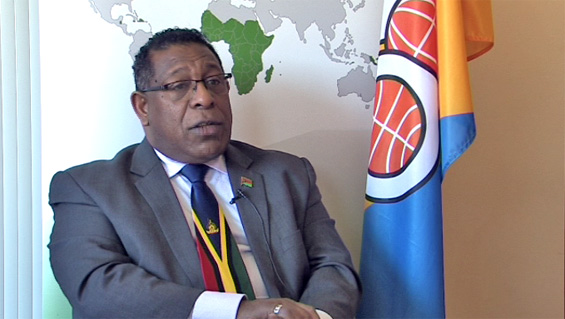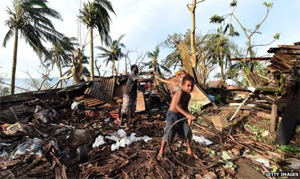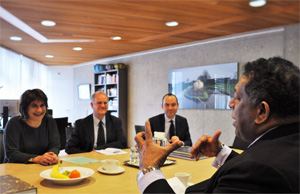INTERVIEW SPECIAL: Featuring the Chairman of the ACP Committee of Ambassadors, H.E Roy Mickey Joy

The Ambassador of the Republic of Vanuatu to the European Union H.E Roy Mickey Joy will preside over the Committee of Ambassadors of the African, Caribbean and Pacific (ACP) Group for the period 1 February 2015 – 31 July 2015. He speaks to ACP Press regarding the significant year ahead for the ACP Group and the international community as a whole vis-a-vis the post-2015 development agenda.
Press ACP: As Chairman of the ACP Committee of Ambassadors, you are taking leadership at a critical time in the group’s history. We know that 2015 is decisive in terms of the global agenda for international development: why is it especially important for the ACP Group?
Ambassador Roy Mickey Joy: I do think 2015 is a very critical year. The ACP Group is at a crossroads. We’ve just witnessed the recent appointment of a new Secretary General and soon his new team will come on board. I think on the one hand, 2015 would provide the ACP a unique opportunity to dialogue, and to be able to take to the international community some of the great work and research that has been done by the Secretary General in his previous capacity as Chair of the Ambassadorial Working Group on Future Perspectives of ACP.
This year we have the UN International Conference on Financing for Development coming up in Addis Ababda, Ethiopia in July to be followed also by the UN Summit on the post-2015 development agenda in New York in September, linking up to COP21 in Paris this year. The ACP has to be fully embraced, fully engaged in this process, in preparing for these three important interrelated events. I think for the meeting in Addis Ababa, the ACP the Secretary General will attend and make a statement, along with the chair of the Sub-Committee on Development Finance, the Ambassador of Samoa H.E Dr. Pa’o Luteru, to ensure that the ACP position is made very very clear and that it be considered a part of the entire process that would lead into the final outcome before the submission is taken to New York.
We feel also that the relationships found within the ACP Group are very strategic. With 79 countries together, we have a strong cohesive group already. The only challenge that we face is that although there are 79 of us, we have not been able to speak with one voice at the required international fora. I think it’s high time we ambassadors, with the support of the Secretary General and his team and our ministers in our capitals, and even the Summit of ACP, have to be able to work together to present a formidable international force. Eventually the ACP will be able to create its own place within the international community as a respected integrated international group of countries. I think that’s where the vision is as far as we are concerned.
PACP: You have mentioned three very major international meetings coming up in the year. What are some of the key development issues that the ACP will be emphasising at these meetings?
RMJ: The issue of SIDS (Small Islands Developing States) is very important to us. I believe a SIDS forum should be a conduit to taking the ACP Group to the next stage. I’ve been part of the early days of the SIDS conference when it took place first in Barbados in 1994, then in Mauritius 10 years later, before going to Samoa in 2014. But the Samoa conference was organised during a critical time for the global community, when the concern and interest in sustainable development has been central. I want to commend highly the Samoan Prime Minister, his entire team and the people of Samoa for putting together such a successful conference. It is incumbent upon the ACP Group to establish a SIDS platform. This hasn’t been done before. We need to be able to take this on board because SIDS has a huge cross cutting agenda.
Secondly, the preparation within the ACP Group for the future of the group itself is crucial. For example, in the context of the 11th EDF, we need to make sure that funds made available go to where they should it be used and where there will be greater impact, particularly in rural economies. I refer particular to the issue of Intra-ACP envelope (an EDF allocation for ACP-wide projects), where for a long time our partners at the European Commission had mostly determined how the funds should be used. We accept that as they provide the resources, but I also believe that because of the joint nature of the ACP-EU arrangement one could also listen more to the ACP side. Now, [after discussions] we feel that the funds are going to be used to support our private sector, our NGOs, our rural economies, and our public private sector endeavours in our countries.
Thirdly, we should focus on the comparative advantages that ACP states have, and why ACP members should work together to identify bankable projects to be able to benefit from not only Intra-ACP envelope but also funds through the blending mechanisms with the European Investment Bank, the Investment Facility, and other forms of assistance that we can be able to extract form the EDF-11 programme for 2014-2020. Those issues will be part of what we will be looking at in the next few months.
PACP: Almost half of the members of the ACP Group are SIDS. Can you elaborate a little more on the unique challenges SIDS face, and how do you plan to being these to the fore of the ACP Group’s work programme?
RMJ: As we speak, my country Vanuatu [has just experienced] a major major tropical Cyclone PAM. It has highlighted some of the key challenges that we face as SIDS. For the Pacific region, including Vanuatu, the issue of sea level rise is something – as is the case of Tuvalu – that we are beginning to see finally coming to reality. For the first time in Vanuatu we are seeing the case of climate change refugees, in two outskirt islands in the northern part of the country, where the government, with the support of the international community, has began moving inhabitants from that island to a much bigger space because it’s already sinking. It’s affecting food security and food production big time, it’s affecting fisheries.
There are projects that are of great interest to us like coconuts and kava, which we in Vanuatu will be taking to export. On coconuts, I would like to confirm that with the leadership of the Ambassador of Samoa and myself, we have singlehandedly nominated the Secretariat of the Pacific Community (SPC) in Noumea to lead the project. We are having regular consultations before submission to the European Commission for the funding of €3.5 million. We have identified two pilots in Samoa and Vanuatu to able kick start the project. We are also very keen to extract more resources from the 11th EDF Intra-ACP envelope to support the regional Pacific coconut development project, which will include most countries in the region.
On kava – which is a project I have worked on for five years – I would like to confirm that after a submission by the Vanuatu Embassy to the ACP-EU Technical Barriers to Trade (TBT) programme, and they have confirmed the nomination of a European legal firm to carry out a kava study. The study will require 7 month work it will look at the legal, scientific and trade aspects of kava. We are also planning to organise a two day conference in Brussels inviting all our actors in the Pacific who are leaders in kava, and the outcome will be shared with the firm conducting the study in the Pacific. This would eventually lead to convening a ministerial conference on kava, to be able to agree on a roadmap that would address the issue of the ban in Germany and Europe. The other issue also is on market issues and ensuring quality standards, so that the product can be able to be exported to Europe and globally.
PACP: Could you summarize how all these efforts feed into the reflections on the future of the ACP Group after 2015 and 2020, and beyond? And related to this, what added value does Vanuatu and member states see in being part of this group?
RMJ: For us coming from the Pacific region, being small, weak and very distant from the major markets, we, especially in Vanuatu, feel that we cannot be left in isolation. In the Pacific, most of us value and see pride in our ACP membership. We benefit significantly.
On the one hand we are confronted with the future of the ACP Group. As you know, the 2020 time line is just around the corner and the ACP-EU Cotonou Partnership Agreement is very clear on this [conclusion of the current partnership framework with the EU]. But on the other hand, I think the emerging challenges we see would allow our group to be able to prepare itself together collectively as a group. For Vanuatu and for other Pacific members, we are also beginning to have bilateral dealings with not only EU members, but also emerging economies within the European continent. If anything falls back at the end of the day, we have to make sure that after 2020 the ACP would exist, but with a totally new configuration. I definitely think there are major major similarities within the Caribbean and Pacific regions, but on the other hand the African diaspora is much huger than ours and that is something we have to work on.
I think the doors are still open and that is why convening the next ACP Summit of Heads of State and Government is an outstanding issue that I would like to conclude as soon as possible. Why is the Summit so important? First, it gives visibility to our grouping; it allows our Heads of State and Government to make major collective political decisions; and thirdly, the report of the Eminent Persons Group has to be submitted for endorsement to the Summit. I think the EPG report (a review of the organisation by 12 prominent ACP figures, including 3 former Presidents) contains some of the major issues and recommendations regarding the future of the Group, our proliferation and why the ACP must remain as a strong unifying force… I’d like to see ACP at the forefront of international politics, to be a group that is reckoned in its own right, and respected by the entire international community.
(Photos: From top – Ambassador of the Republic of Vanuatu to the EU H.E Roy Mickey Joy; Devastation following Cyclone Pam in Vanuatu on 14 March 2015/Photo by Getty Images; Ambassador Joy with theDutch Minister for Foreign Trade and Development Cooperation, H.E. Mrs. Lilianne Ploumen and team. The Government of the Kingdom of the Netherlands offered €2,5 million in immediate relief to Vanuatu following Cyclone Pam/Photo by Vanuatu Consulate in the Netherlands).
-Press ACP
